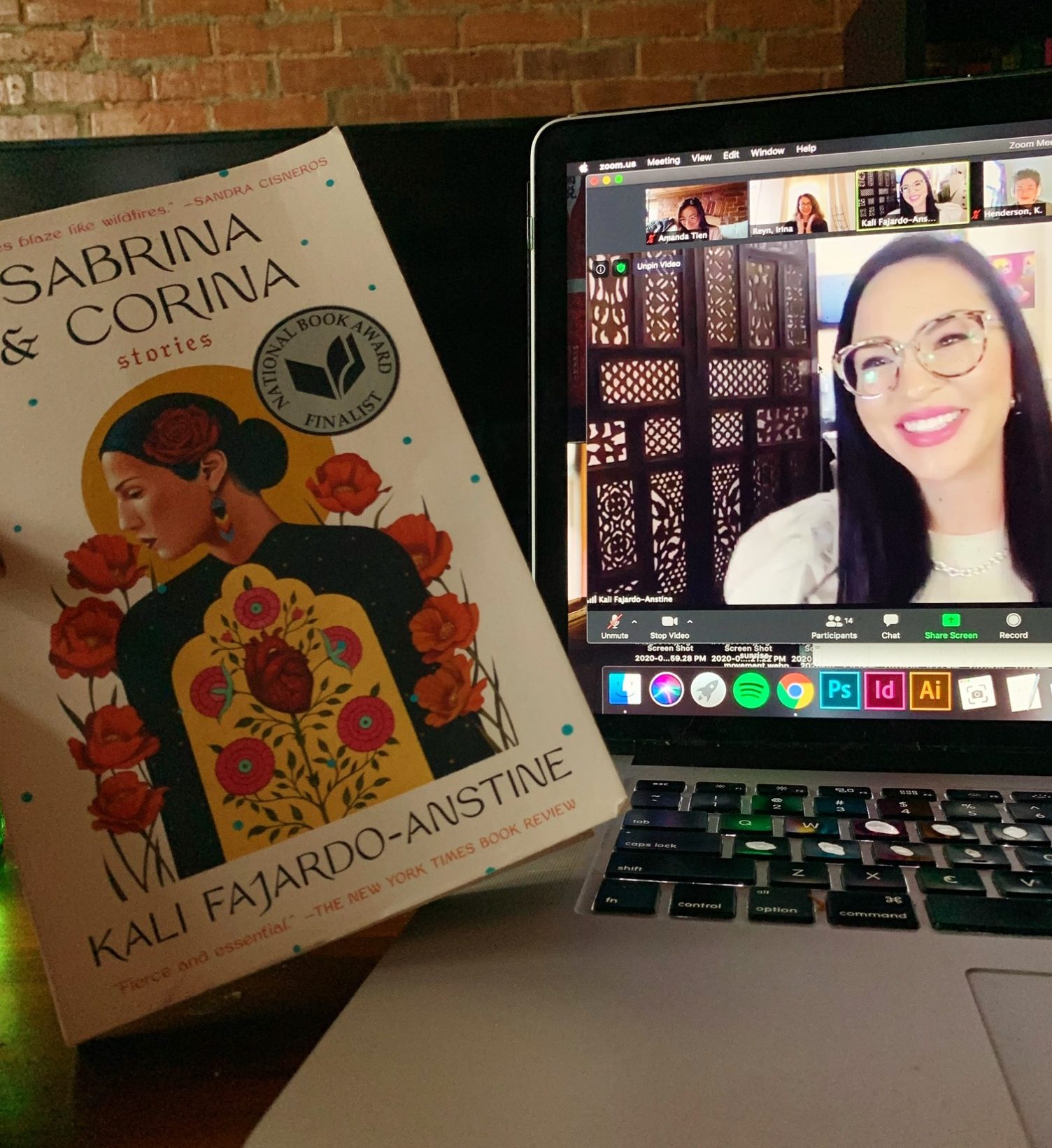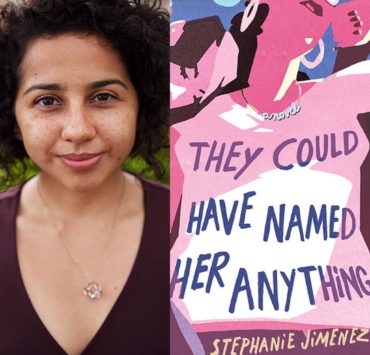
On October 2020 Kali Fajardo-Anstine visited the University of Pittsburgh as the winner of the Fred R. Brown Literary Award. She joined two PITT MFA fiction students, Aeriel Merillat and Tanya Shirazi for an evening conversation. Kali Fajardo-Anstine is the author of Sabrina & Corina (One World, 2019), finalist for the National Book Award, the PEN/Bingham Prize, The Story Prize, The Saroyan International Prize, and winner of an American Book Award and Reading the West Award. Fajardo-Anstine is the 2019 recipient of the Denver Mayor’s Award for Global Impact in the Arts.
Tanya Shirazi: Thank you so much for being here. We’re so excited to have you. We really wish this conversation could have been held in person. How about you share with us your trajectory as a writer and as an author.
Kali Fajardo-Anstine: I always knew I wanted to be a writer. I started writing little stories in second grade and I read chapter books obsessively. One of my first jobs was working at a bookstore. I studied English and Chicanx Studies at Metropolitan State University in Denver and in one of my last semesters, a professor said, “Hey, what are you planning to do after you graduate?” I said that I wanted to become a librarian so I could be around books. But this professor suggested I apply to MFA programs, and that seemed like a pretty good way to be around books, too. Unfortunately, I was rejected by many MFA programs and I actually dropped out of my first program, but I eventually graduated from the University of Wyoming MFA in 2013 with a thesis called “Sugar Babies and Other Stories.”
After that, I began working on a novel and moved all over the country looking for a way to support myself and write at the same time. It wasn’t until 2017 that I was able to get a book deal from One World for both books. Sometimes it takes a long time after graduating from an MFA program for a writer to get published, and that’s OK.
Aeriel Merillat: I have a question about social media. You sometimes do Instagram live streams and respond to Q&As. I was wondering how you find social media helpful as a writer or connecting to younger writers?
KFA: On social media, I love to engage with readers and writers and I’m a very visual person. It’s been an incredibly helpful space to connect. Also, for Latinx creatives, there’s a big support system on Instagram. Not just in the writing world, but across film and activism and art, a great space to meet and have communion with each other.
AM: That’s great. Are you on Twitter, too?
KFA: I’m on Twitter, but honestly, I use it so I can screenshot my Tweets to post to Instagram.
AM: We saw a Tweet that you screenshot and shared on Instagram about people not liking short stories as much. And you’re always shocked when you hear that. Why did you publish a collection of short stories first before a novel? It seems it might be easier to publish a novel first. Where does your love of short stories come from?
KFA: It’s funny you bring that up. When someone tells me they don’t like short stories, I feel like they’re talking shit about my family or someone I love dearly. It’s so personal and I feel protective of the form.
I was first exposed to short stories in literature classes and I feel deeply in love. I read Sandra Cisneros’ collection Woman Hollering Creek and was so blown away. I got into Drown by Junot Diaz. And Alice Munro’s work was life changing for me. I support outcasts, underdogs. The short story is a perpetual literary outcast. It hurts when people say they don’t like it, why would you pick on this little thing? Let it live!
TS: You’re a trailblazer for Latinx women writers. My mother is from El Salvador. Sometimes it feels like writing from the margins within the margins in LA. How do you find yourself in conversation amongst the Latinx community? It’s impactful and powerful that your narrative contributes to the truth that Latinx identity is not a monolith.
KFA That is important. I’m excited for work that’s going to come out of the Salvadorans in LA. We are many cultures built into the Latinx framework and sometimes the nuance of our different identities can get lost to shorthand, stereotypes and discrimination. I had a lot to write against when I was starting out, but work that breaks down stereotypes is going to allow more nuanced work in.
One of my best friends is the writer Ivelisse Rodriguez and she’s Puerto Rican. Growing up in Denver, I didn’t know many Puerto Ricans as a child, but through literature I’ve gotten to learn about different Latinx communities and it’s so moving that even with our vast differences we have incredible commonalities that connect us. Sometimes readers will write to me and say, “your family does not resemble mine, but I identify with these stories.” That’s such a powerful statement, and hopefully it means publishers will take more chances on nuanced writing from across the Latinx spectrum.
TS: I don’t know much about Denver, but your characters— I am gutted in the best way possible by their stories. They’re also resilient. There’s something about their uniqueness that makes them universal. I love War Stories, it’s one of my favorite collections.
KFA: Yes! It’s an incredible book. I met Ivelisse at a workshop in 2012. She read Sabrina & Corina during the workshop and followed me outside after class. She very calmly approached me and said, did you write this story? And I said yes, and we became friends, it was instantaneous. We’ve given each other a lot of different kinds of writely support over the years, and I’m grateful.
TS: I do have a follow up question with that. Who do you find yourself in conversation with? People want to say that we’re only in conversation with our specific group of people. We’re all talking, right? So who do you feel like are your kin writers and community?
KFA: Well, I’m deeply in conversation with Arturo Islas, who passed away in 1991. His book, The Rain God, was the first time that I saw this subdued realism that was presented from a Chicano context. And I thought I want to write like this. So beautiful. I’ve mentioned Edward P. Jones who wrote Lost in the City and The Known World, I feel kinship with his characters and his work. Alice Monroe, Katherine Anne Porter, Gabriel Garcia Marquez, and Jose Saramago from Portugal. My influences are vast.
AM: I have a question about your novel. How do you see your novel in communication with Sabrina & Corina? And whether or not it was a short story before you turned it into a novel. That happens, you’re excited to write a short story, then it blossoms into something larger.
KFA: I have had several novel ideas come to me, and they’re different from my stories. When a story idea appears to me, I can usually sense that it’s a story and not a novel–just in terms of the largeness of the tale. My forthcoming novel is the book I have wanted to write since I was a little girl. I think of my novel characters as the great grandmother generation of the girls in Sabrina & Corina. It’s like my own Marvel Universe. My characters might not always be in the same book, but they live in the same plane.
AM: How do you know when it’s going to be a short story, or when it’s going to be a novel? Is there something that signals that to you?
KFA: The bigness of the idea and whether or not I want to spend years with the characters. With a short story, I don’t usually need to invest years of my writing life, but with a novel, buckle up for the long haul.
TS: I have a follow up question regarding the short stories, there’s so much feminine power from a place that comes from, great pain, but an immense love for your characters, for women, motherhood and lineage. It expands on the page, and it makes the writing palatable. And I’m thinking about endurance as a writer. Sometimes people talk about endurance when it comes to like a longer piece or even a collection of poems. But how do you manage endurance in your writing? Because I’m sure that it’s evocative and heavy for you. What is your self care process? You know, because you hadn’t habits, identity of the many of the characters?
KFA: Yeah. And this is a good question. I love that your questions are so smart, thank you guys. I’m starting to realize something about myself is I have a lot of mental energy.
These characters can override me for a while in a way that’s uncomfortable. So for an example, Alicia, in “All her Names”, when I was working with her and the last story of the character who tells the story. Both of the characters change my thought patterns. I started thinking in their cadence, and it was uncomfortable. If that starts to happen, I will go and I’ll take a break in nature. I’ll go for a long walk, I go on very long walks, to clear that energy out. But they definitely can get in you.
In terms of self care, walking, trying to cleanse out that energy with other people’s work and other artists’ creations. If you read something else, it clears you out and moves you in the direction of that voice. But be more gentle and kind with yourself. That helps.
TS: I asked about transference from characters, because writers can be enmeshment with their characters. When that happens how are they detangled? It’s good you find reading as a cleanse for that.
KFA: I’m glad you asked. We don’t think about how writing stories impact our psyche. We’re taking it on. The first time I killed a character I cried for a while. It’s hard work on our souls.
TS: What other mediums feed your creativity?
KFA: I’m into research. I like visual art. I’m equally influenced by visual artists and musicians as I am by literature. I like actors, they’re fascinating people. I love reading their interviews, watching them, they are channeling characters as well. We have a lot to learn from them. They have to emote another personality. I also love fashion and vintage clothes. I’ll look at thrift stores to find a dress I want to put on a character; I can see scenes in those clothes.
TS: If you had a soundtrack to accompany Sabrina and Corina, what songs would you include?
KFA: I write a lot about music. I’m a big music fan. I was into indie rock and punk rock. When I was younger, I used to go to shows all the time. I’m a big Bob Dylan fan. The epigraph of the book comes from “Sadeyed Lady of the Lowlands.” Patsy Cline, her songs, early R&B, Monica and Brandy, The Fugees, Neil Young, Steely Dan. There’s lots of music in this collection.
TS: It’s funny because I grew up hearing my mom listen to “Have You Ever” by Brandy, and “The Boy is Mine”. Those songs would play in my house too with my grandparents also listening to like, old school music from El Salvador. It was interesting seeing that fusion. Yeah, so I remember hearing have you ever and thinking, ‘I want to love like that.’ Then I’m six and I’m listening to Selena’s “Missing my Baby.’ I would lie in bed, crying.
KFA: That’s so cool. I love that fusion. When Selena died, it was so traumatic for us. I was in the sixth grade dressing like her and we would watch her videos.
TS: That was all of us, publicly grieving collectively.
AM: The last question we have is from the Contemporary Readings class at Pitt MFA. The question was, “Obviously, everyone should read the whole collection. But if someone was only going to read one, which one would you want them to read?”
KFA: It depends on what they need in their life. “Sugar Babies” is a good introduction to my work. It shows my range and humor, not every story has a lot of humor in it. I think that can temper other emotions we have, reading can make things a little bit easier.
Kali Fajardo-Anstine is the author of Sabrina & Corina(One World, 2019), finalist for the National Book Award, the PEN/Bingham Prize, The Story Prize, The Saroyan International Prize, and winner of an American Book Award and Reading the West Award. Fajardo-Anstine is the 2019 recipient of the Denver Mayor’s Award for Global Impact in the Arts. Her writing has appeared print and online at Harper’s Bazaar, ELLE, O, the Oprah Magazine, The American Scholar, Boston Review, Bellevue Literary Review, The Idaho Review, Southwestern American Literature, andelsewhere. Kali has been awarded fellowships from Yaddo, MacDowell Colony, Tin House, and Hedgebrook. She holds an MFA from the University of Wyoming and is from Denver, Colorado. Her work has been translated into multiple languages.
Aeriel Merillat (she/her) is a fiction writer and MFA candidate at the University of Pittsburgh. She’s currently working on her first novel set in the panhandle of Florida. She has work published in the Massachusetts Review. You can find her on Twitter @aerielmerillat.
Tanya Shirazi is a fiction writer. A Los Angeles born and raised Salvadoran, she is based in Pittsburgh, Pennsylvania and serves as the Managing Editor for Aster(ix) Journal. She’s currently working on her first novel. You can find her on Instagram @pakidoran.explorer.
Image Credits: Amanda Tien







